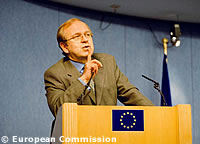Liikanen: Faster response needed on unbundling local loop - or else
Erkki Liikanen, the European Commissioner for Enterprise and the Information society, received strong support from MEPs on 12 June when he claimed that legal action may need to be taken against Member States if no progress were made implementing the EU regulation on unbundling the local loop by October. Speaking to the industry committee in Strasbourg, Mr Liikanen pointed out that only nine of the Member States had unbundled their local loop, despite the European regulation having come into force on 1 January 2001. It requires the opening up to competition of the final stretch of the link between the customer and the network. This is often owned by the former telecommunications monopoly company in Member States and failure to open up its use to competition has meant prices being considerably higher than those in countries with unbundled local loops. This in turn has hindered take up of the Internet. Mr Liikanen explained that he understood that the opening up of the local loop could not take place overnight, and emphasised that he was aware of the many changes that were required in order to make the changeover, including software, collocation and pricing issues. He also stressed that he believed that the national regulatory authorities (NRAs) were addressing these issues. 'In our view, the national regulatory authorities have been genuinely very active in coming to grips with these issues,' he said. But he also pointed out that the European regulation is directly applicable in the Member States (it does not require transposition), so this should have led to quicker implementation in the Member States. He also said that one of the main reasons infringement proceedings had not been brought against some Member States already was that it would probably be counter-productive at the moment, while the NRAs are still making genuine efforts to address the situation. 'In our view, proceedings would at this point provide a distraction without bringing material benefits to new entrants,' he said. However, he made clear that this would no longer be the case if 'the preparations for the seventh implementation report in October show failure on the part of the national regulatory authorities to give effect to the regulation.' A stronger stance was also advocated by some MEPs, notably the former rapporteur on the regulation, UK MEP Nicholas Clegg. He said incumbents who were dragging their feet in implementing the regulation should be warned that they were 'drinking at the last chance saloon'. He was concerned that present incumbents were using technical excuses to delay implementation and that even when this did take place, preferential treatment was being given to the incumbents' subsidiary or affiliate companies.

